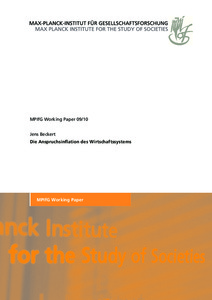Die Anspruchsinflation des Wirtschaftssystems

Max Planck Institute for Demographic Research, Rostock ; Beckert, Jens
MPIfG - Köln
2009
20 p.
capitalism ; economic recession ; economic system ; governance
MPIfG Working Paper
9
Business economics
German
Bibliogr.
"The paper takes a theoretical look at the current financial and economic crisis, drawing on existing theories on crises of capitalism. I develop the thesis that the theories of 'ungovernability' and 'late capitalism' were wrong in locating the origins of crises in contemporary capitalism only indirectly in the economy. The theory of late capitalism, however, rightfully pointed out that the state cannot reduce its influence over the economy without endangering the functioning of markets themselves. This is due less, however, to the difficulty of maintaining loyalty, i.e. political support for the capitalist system than to the more immediate challenge of sustaining the preconditions for the system's economic viability. Today, a theory of the crises of capitalism must devote much more attention to the intrasystemic preconditions of the economic system.
Der Beitrag reflektiert theoretisch die gegenwärtige Finanz- und Wirtschaftskrise, wobei die Ausführungen im Zusammenhang mit bestehenden Krisentheorien stehen. Meine These ist, dass die Krisentheorien der 'Unregierbarkeit' und des 'Spätkapitalismus' darin falsch lagen, den Ausgangspunkt von Krisen nur noch indirekt im Feld der Ökonomie zu verorten; die Theorie des Spätkapitalismus lag jedoch richtig in der Annahme, dass der Staat seine Steuerungsansprüche nicht reduzieren könne, ohne die Funktionsfähigkeit des Marktes selbst zu gefährden. Dabei geht es aber weniger um das Problem der Sicherung von Massenloyalität und damit um die politische Unterstützung des kapitalistischen Wirtschaftssystems als vielmehr sehr viel direkter um dessen ökonomische Bestandsvoraussetzungen. Eine Krisentheorie des Kapitalismus muss heute viel stärker die intrasystemischen Funktionsvoraussetzungen des kapitalistischen Wirtschaftssystems berücksichtigen."
Digital
The ETUI is co-funded by the European Union. Views and opinions expressed are however those of the author(s) only and do not necessarily reflect those of the European Union or the ETUI.